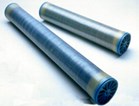Koch Membrane Systems Offers ROGA Cellulose Acetate Membranes For High Organic Fouling Environments

Delivers Superior Fouling Resistance and Chlorine Tolerance
 Wilmington, MA — Koch Membrane Systems, Inc. (KMS), a world-class developer and manufacturer of innovative membrane filtration and separation products, offers its FLUID SYSTEMS® ROGA® line of cellulose acetate membranes. ROGA membranes are a widely deployed, long-proven solution in treating industrial and municipal wastewater where greater fouling resistance is key.
Wilmington, MA — Koch Membrane Systems, Inc. (KMS), a world-class developer and manufacturer of innovative membrane filtration and separation products, offers its FLUID SYSTEMS® ROGA® line of cellulose acetate membranes. ROGA membranes are a widely deployed, long-proven solution in treating industrial and municipal wastewater where greater fouling resistance is key.
The ROGA membrane is the "original" spiral wound membrane developed by the FLUID SYSTEMS pioneers of Koch Membrane Systems. These highly versatile membranes remain a top performer today. The combination of smooth surface morphology, neutral charge and chlorine tolerance can make them ideal for high fouling applications. The ROGA cellulose acetate ultrafiltration element uses a very low pressure membrane and is particularly well-suited to natural organic and color removal applications. ROGA high rejection reverse osmosis elements, which offer the unique advantage of chloride tolerance as compared to Thin-Film Composite (TFC®) membranes, are useful for desalinating feed sources that have high biofouling potential. The ROGA reverse osmosis elements deliver a 98 percent chloride rejection rate at medium pressure and can tolerate low-level, continuous chlorine additions.
ROGA reverse osmosis elements are available in a variety of sizes for new systems or as replacements for existing systems, including 4-inch and 8-inch diameters and 40-inch or 60-inch lengths. The ROGA ultrafiltration elements have an 8-inch diameter and a 60-inch length.
Additionally, KMS offers a complete line of antiscalants, cleaners and maintenance chemicals for all ROGA membranes. KOCHTREAT? antiscalants and KOCHKLEEN? membrane cleaners help prolong membrane life and reduce cleaning cycle time. All KMS chemical formulations are carefully reviewed by the company's process engineers and polymer scientists to verify that they will provide excellent performance benefits, including physical and chemical compatibility with the membranes.
SOURCE: Koch Membrane Systems
